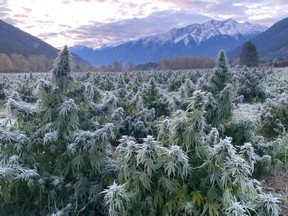You are here
Home 🌿 Recreational Marijuana News 🌿 Paralympian pivot: Snowboarder Tyler Mosher now 'slugging it out' on the cannabis trail 🌿Paralympian pivot: Snowboarder Tyler Mosher now 'slugging it out' on the cannabis trail

In his mid-40s, Mosher got an Executive MBA and went into CBD. There's only one problem: market regulation
Buy a new pickup truck, run a marathon, transform the family basement into a man cave, express a sudden interest in personal fashion, daydream about being taller, younger and more handsome. Such are the clichéd male musings as he wrestles through midlife, a period of self-reflection capable of spurring some to action and others to simply grumble about how it sucks to get old.
Tyler Mosher isn’t much of a complainer, although it would be understandable if he were, given he relies on a $2 plastic catheter to get the deed done every time he goes to the washroom.
“I am so used to being paralyzed — going pee is the biggest thing — that’s the biggest reminder,” said the former world champion snowboarder and Paralympian who shattered his spine flying off a cliff in Whistler, B.C., in 2000.
The accident left him 40-per-cent paralyzed from the waist down, but he was able to compete at the 2010 Paralympic Winter Games in Vancouver in para-Nordic skiing and four years later at the Sochi games on a snowboard.
Mosher also worked his way back from his injuries to build a thriving landscaping and design business in the Whistler area, which funded his para-snowboarding adventures. It was an ideal life of “semi-retirement,” he said, but one that seemed less ideal as he hit his mid-40s and realized it wasn’t time to express a sudden interest in personal fashion, but to get an Executive MBA at Queen’s University in Kingston, Ont., and pivot into the cannabis industry.
“I had what I call a lifestyle business for 20 years, and now I have an exponential-opportunity business, and I really want to prove to myself that I can do it, too,” said the now 49-year-old chief of business development at B.C. Hop Company Ltd., Flow Scientific Ltd. and Kinloch Naturals, a trio of enterprises that grow and develop premium, hemp-derived cannabidiol (CBD) products.
Within the larger legalized cannabis milieu, CBD products, unlike tetrahydrocannabinol (THC) products, a.k.a. joints, don’t possess any psychoactive elements, meaning they don’t get the user high. Rather, what studies and user testimony suggest — and experts universally agree more studies are required — is that CBD-enriched chocolate bars, oils, drinks, bath salts, creams, capsules, vape cartridges and other products currently sold at government-licensed cannabis stores could help ease an individuals’ aches and pains, relieve anxiety and function as a sleep aid.
“We are trying to be everything, but the THC guys,” Mosher said.
They are trying to elbow their way into the health-and-wellness space with a plant-based, non-psychoactive, anti-inflammatory potential wonder drug that comes packaged as a chocolate bar and isn’t cooked up in a Big Pharma lab, but harvested from farms in British Columbia and Ontario. The kicker: it is perfectly legal — an ibuprofen, if you will, derived from Mother Earth.

Fans, including Mosher, who doesn’t smoke weed but uses cannabidiols to increase his range of “movement,” believe the market for CBD products is primed to explode to an order of magnitude far greater than the $4 billion in annual retail cannabis sales Canadians are currently ringing up some three years after legalization. Others feel the same way.
“There is clearly a consumer segment of the cannabis market that is more focused on health and wellness, and I have to believe that segment would expand dramatically if you could access CBD products outside the regulated cannabis market,” said Rishi Malkani, who heads Deloitte Canada’s cannabis practice.
But therein lies the regulatory rub that Mosher and Co.’s ambition keeps slamming up against, a profit-killing pest best explained by an example.
Picture a middle-aged guy with a bad back and other assorted aches and pains, who hasn’t smoked weed since the mid-’90s and has no plans of starting now. That guy, achy though he may be, probably isn’t going to dash down to the local, fully licensed “regulated” cannabis dispensary to browse for a pound of CBD-infused bath salts. However, if those same salts were in the health-and-wellness section at the grocery store — or sold on Amazon.ca — the guy just might buy in.
As it stands now, he isn’t buying enough, at least not in the regulated marketplace, and it isn’t for lack of demand. An October 2021 CBC Marketplace investigation revealed there is a thriving black market for unregulated CBD products. Consumers are consuming, but they’re generally not purchasing from stores with licences, excise taxes to pay and quality-assurance standards to meet. That is costing the regulated players “billions,” according to Mosher.George Smitherman, chief executive of the Cannabis Council of Canada, said Mosher’s gripe isn’t an outlier.
“If you talk to 10 CEOs of licensed cannabis producers and say, ‘So, what is grinding your gears these days,’ the absence of clarity around cannabis health products — and CBD regulation — would definitely be on the list,” he said.
Mosher’s company did $20-million worth of deals in 2019, during the heady, early days post-legalization. That money was then poured back into the business to expand its hemp supply network, and build both a $1.8-million “belt dryer” to enhance efficiency and a quality-assurance lab, all in anticipation of the CBD market going gangbusters. It didn’t.
The culprit, industry players say, is the federal Cannabis Act. From its inception, the act has made no regulatory distinction between THC and CBD products. One gets you high and one doesn’t, but the government believes they should be regulated the same way.
“Why you can’t buy a bath bomb with CBD in it at Walmart is beyond me,” Mosher said.
“I do have empathy for Health Canada, because they are trying to keep everyone safe, but on the one hand, they are saying,
‘If you are over 19, you can buy CBD at this store and you are safe, but if you buy it elsewhere, you are unsafe.’ It makes no sense.”
Equally baffled by the current state of the act is Ross Rebagliati, the 1998 Winter Olympic snowboard gold medallist in Nagano, Japan. Remember him? He was temporarily stripped of his prize after testing positive for marijuana, sparking an international incident and a 15-minute run of global fame that landed him, among other places, on The Tonight Show with Jay Leno. Nowadays, he is a “master grower” — and kids’ snowboarding coach — living in Penticton, B.C.
On a recent afternoon, Rebagliati was found working away at the newly licensed Green Mountain Health Alliance’s greenhouse, helping prep the facility for its inbound marijuana plants, which are to be organically grown. The Financial Post had last caught up with the now 50-year-old at a pro-legalization rally in Toronto in April 2015. Rebagliati was leaning against a wall, puffing on his seventh joint of the day and touting, as he had for years, the benefits of marijuana use.
Part of his ultimate plan in working with Green Mountain’s growing team is to develop a “Ross’ Gold” CBD cream for athletes, armchair or otherwise, eager to unlock their “potential” and soothe their aches and pains.
“There are huge opportunities there if Health Canada is able to act and lead,” he said.
“The message for me, really since Nagano, has been about how people can build cannabis use into a healthy lifestyle.”
In the small world that is B.C. mountain culture, Mosher, the para-snowboarder, did the landscaping prep work for Rebagliati, the golden boy, before he listed his Whistler home for sale and moved to the Okanagan. The two haven’t talked in about 18 months, but they speak a similar language about how legalization was a giant step in the right direction, and both agree there is more work to be done.
On that note, Mosher had a plane to catch, meetings to Zoom into and a health-and-wellness revolution to launch. He is giving himself 10 to 15 years of “slugging it out” to find a business home run before he gets back to semi-retirement.
“So far, it has been a lot of winning and losing, and not knowing where things are, and it is exhilarating,” he said of a cannabis industry executive’s life.
“But I can’t wait until CBD has a place in every store in Canada, and is as common as taking vitamin C.”
420 Intel is Your Source for Marijuana News
420 Intel Canada is your leading news source for the Canadian cannabis industry. Get the latest updates on Canadian cannabis stocks and developments on how Canada continues to be a major player in the worldwide recreational and medical cannabis industry.
420 Intel Canada is the Canadian Industry news outlet that will keep you updated on how these Canadian developments in recreational and medical marijuana will impact the country and the world. Our commitment is to bring you the most important cannabis news stories from across Canada every day of the week.
Marijuana industry news is a constant endeavor with new developments each day. For marijuana news across the True North, 420 Intel Canada promises to bring you quality, Canadian, cannabis industry news.
You can get 420 Intel news delivered directly to your inbox by signing up for our daily marijuana news, ensuring you’re always kept up to date on the ever-changing cannabis industry. To stay even better informed about marijuana legalization news follow us on Twitter, Facebook and LinkedIn.




